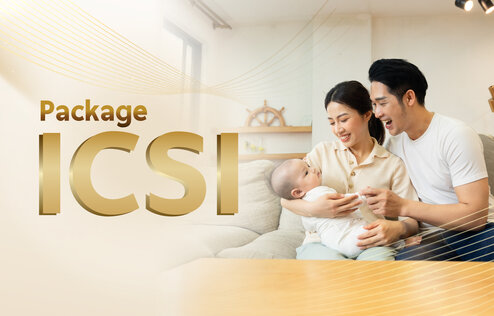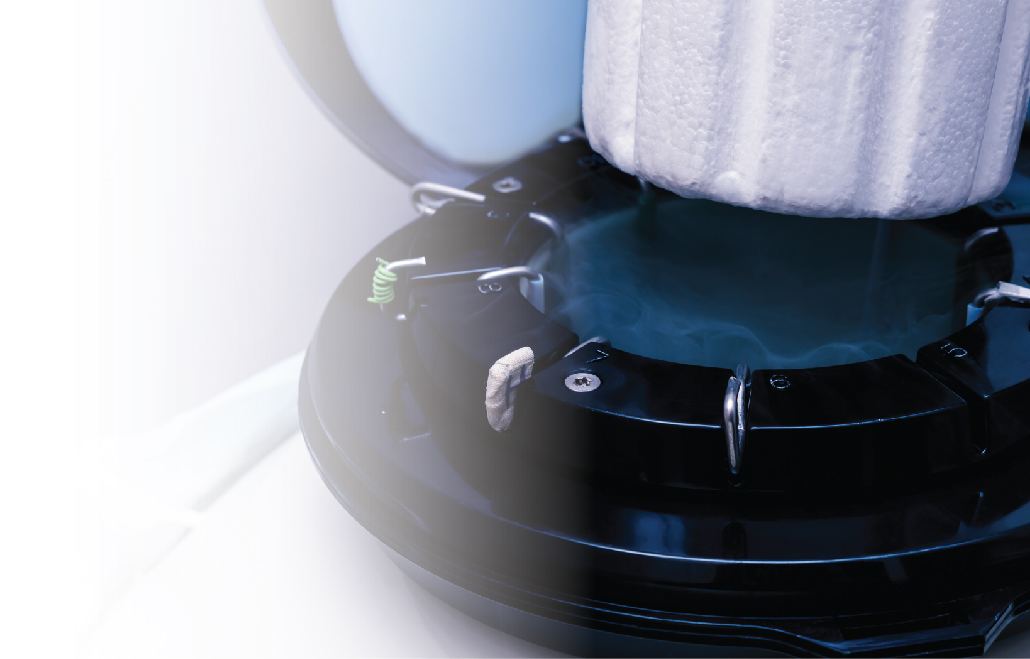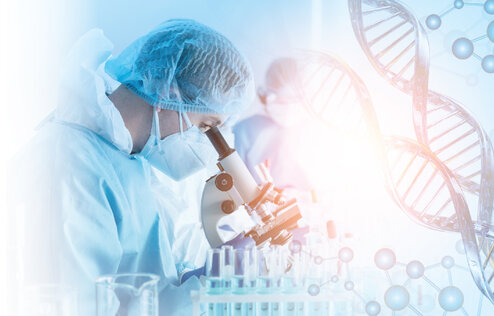Infertility: A Common Reproductive Issue That Can Prevent Pregnancy
Center : Nakornthon Gift Fertility Center
Article by : Dr. Ong-Arj Bovornsakulvong
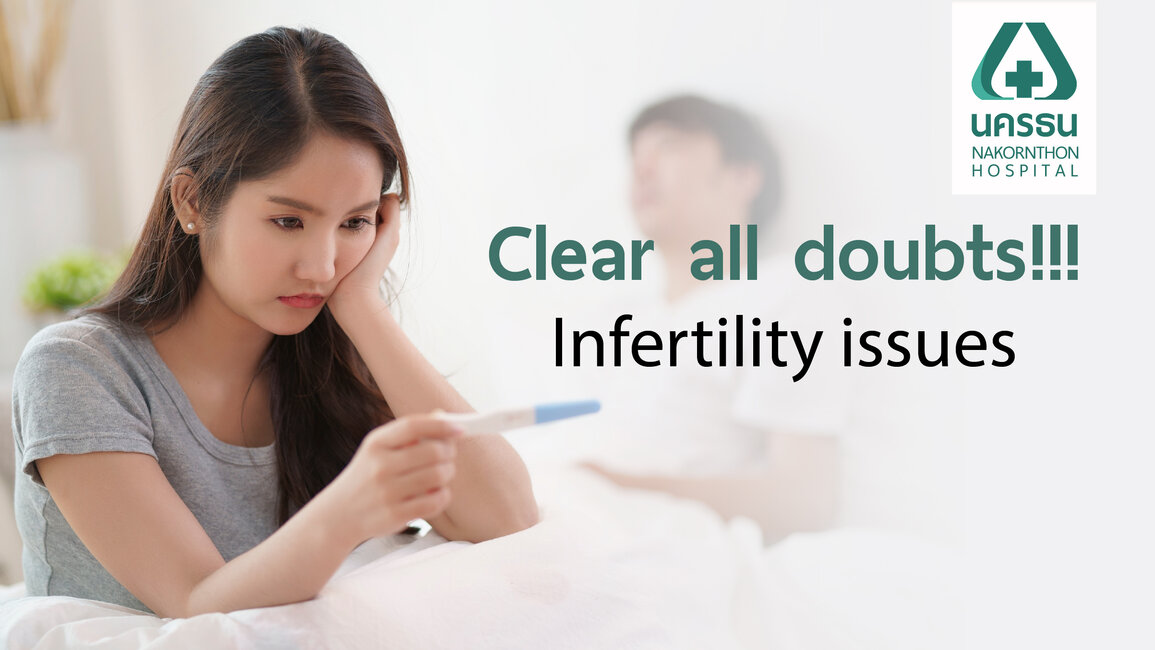
Infertility can be a deeply emotional and challenging issue for married couples who dream of starting a family. Despite trying various methods without success, there are still many ways to increase the chances of pregnancy. Whether through lifestyle changes, medical treatments, or assisted reproductive technologies, infertility is a condition that can be treated with the right diagnosis and care, offering hope to those who may feel infertile or discouraged.
At Nakornthon Gift Fertility Center, part of Nakornthon Hospital, a team of fertility specialists is ready to provide consultation and tailored treatments for individuals or couples experiencing difficulty conceiving. With advanced technologies and a wide range of options such as ICSI and IVF, the center offers effective solutions to overcome infertility and help make the dream of parenthood a reality.
Table of Contents
Causes of Infertility


Infertility can stem from a variety of causes, generally categorized into three main groups: female factors (approximately 40%), male factors (around 40%), and unexplained or combined causes (about 10–20%). Understanding these causes is the first step toward seeking effective treatment.
Causes of male infertility
- Abnormal sperm production or issues with sexual function, such as erectile dysfunction or retrograde ejaculation, where semen flows backward into the bladder
- Poor sperm quality, including low motility or abnormal morphology
Causes of female infertility
- Age-related decline in ovarian function
- Uterine fibroids, which may interfere with embryo implantation
- Ovarian cysts, particularly endometriomas or “chocolate cysts,” which can significantly reduce the number of healthy eggs
- Blocked fallopian tubes or irregular ovulation, including chronic anovulation or diminished ovarian reserve due to aging
What is Unexplained Infertility? :
In some cases, infertility has no clearly identifiable cause from either partner. In such cases, further diagnostic evaluations are conducted. These may include:
- Physical examinations
- Transvaginal ultrasound to assess the uterus and ovaries
- Semen analysis for the male partner
- Hormonal blood tests
- Hysterosalpingography (HSG) to check for blocked fallopian tubes
Even when no obvious cause is found, modern medical technology and reproductive treatments can often offer hopeful paths forward.
When Should You See a Fertility Specialist?
Infertility is generally defined as the inability of a couple to conceive after one year of regular, unprotected intercourse (around 2–3 times per week). According to the standard infertility definition, this condition may affect both men and women and can be caused by various factors including hormonal imbalances, structural abnormalities, lifestyle, or age-related decline. If you have been trying to conceive without success for this period, it is advisable to consult a fertility specialist or an infertility specialist to evaluate potential underlying causes and explore suitable treatment options.
However, there are several cases where medical consultation should be sought even earlier. For example, couples where the woman is over 30 years old or has underlying health issues, irregular menstrual cycles, or severe menstrual pain may be at higher risk. Based on the infertility definition, early diagnosis is key to effective management and improving the chances of conception.
In addition, some couples choose to undergo preconception health screenings before actively trying to conceive. These assessments can help detect early signs of infertility in either partner and allow for timely medical support, especially for those already aware of potential risks based on personal or family history.
Male Infertility
- Low semen volume
- Inability to ejaculate
- Retrograde ejaculation (semen flows backward into the bladder)
- Erectile dysfunction
- Pain or swelling in the testicles
- Presence of lumps or abnormalities in the testicular area
- Decreased libido or reduced sexual desire
- Reduced body or facial hair
- Chronic health conditions such as diabetes or high blood pressure
- Being significantly overweight or underweight
If you are experiencing any of these symptoms, it’s important to consult a specialist to evaluate your reproductive health and explore potential treatment options.
Woman Infertility
Female infertility can manifest through a variety of physical or hormonal symptoms that may interfere with ovulation, fertilization, or implantation. Common signs that may indicate infertility in women include:
- Irregular or abnormal menstrual cycles
- Very light or excessively heavy periods
- Severe menstrual cramps
- Chronic lower abdominal or pelvic pain
- Pain during intercourse
- Abnormal vaginal discharge, such as unusual color or foul odor
- Unexplained vaginal bleeding
- Excessive body or facial hair
- Sudden or significant weight gain or loss, thinning hair, or hair loss
- Low sexual desire
If any of these symptoms are present, it may be a sign of an underlying condition affecting fertility. Consulting a fertility specialist early can help identify and address the root causes of infertility effectively.
Infertility Diagnosis
Wondering what to do if you're having trouble conceiving? Start with a comprehensive infertility evaluation at the Nakornthon Gift Fertility Center, Nakornthon Hospital. Our goal is to identify the root causes of infertility—in both men and women—so we can provide personalized and effective treatment options.
The diagnostic process typically begins with a detailed medical history and physical examination of the couple. From there, the doctor may recommend several laboratory tests, such as:
- Blood tests
- Thalassemia screening
- Urinalysis
- Screening for hepatitis B and other infections
Additional specialized tests may also be performed to further investigate potential causes and determine the most appropriate treatment plan.
Men
In diagnosing male infertility, a key procedure is semen analysis, which evaluates the quality of the sperm. This test assesses several important factors, including:
- Sperm count (the number of sperm in the semen)
- Sperm motility (how well the sperm move)
- Sperm morphology (the size and shape of the sperm)
- Overall sperm health and viability
Understanding these parameters helps identify potential causes of infertility and guides the appropriate course of treatment for men experiencing difficulty conceiving.
Women
Diagnosing female infertility involves several tests to evaluate reproductive health. One of the primary methods is pelvic ultrasound, which helps detect abnormalities in the uterus and ovaries. In addition, key hormone tests are conducted to assess ovarian function and hormonal balance, including:
- AMH (Anti-Müllerian Hormone): Indicates ovarian reserve and helps assess whether the ovaries are functioning within normal limits.
- TSH (Thyroid-Stimulating Hormone): Detects thyroid dysfunction, which can impact hormonal balance and fertility.
- Prolactin: A hormone that plays a role in stimulating ovarian function; elevated levels can disrupt ovulation cycles.
- FSH (Follicle-Stimulating Hormone): Stimulates the growth of eggs in the ovaries and is essential for regular menstrual cycles.
These evaluations provide essential insights into the causes of infertility in women and guide the selection of the most appropriate treatment.
Treatments for Infertility
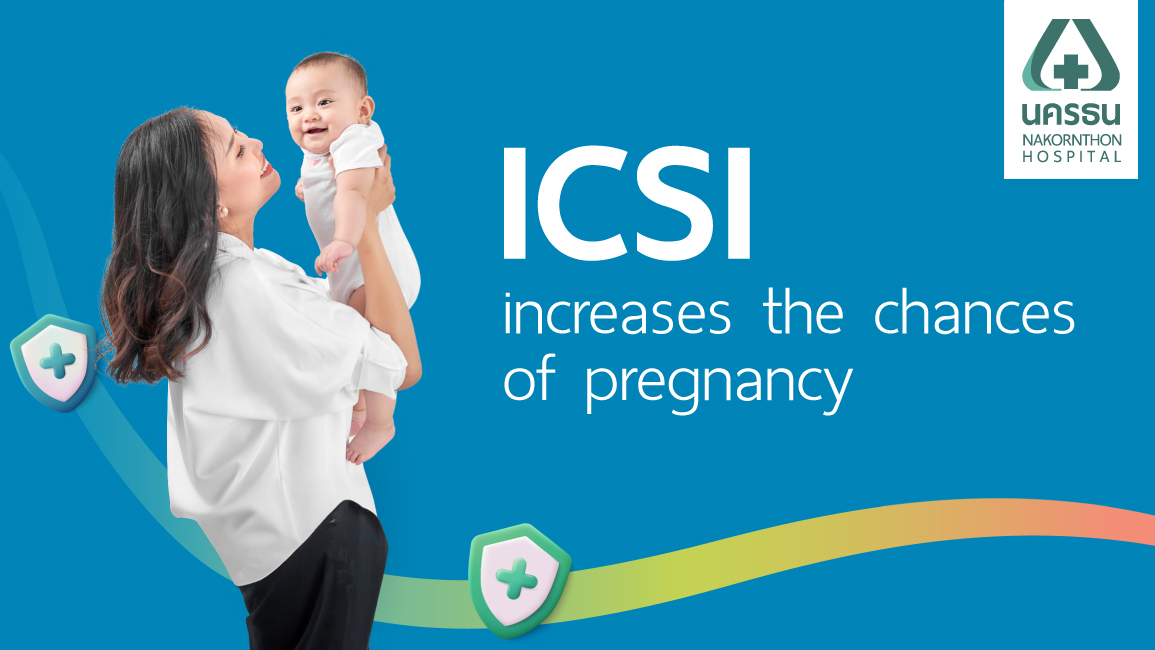

Infertility can be treated through a variety of medical approaches, and at Nakornthon Gift Fertility Center, Nakornthon Hospital, each patient receives a personalized treatment plan based on their specific needs. Treatment options may include medication therapy to stimulate ovulation or regulate hormonal balance and surgery to correct anatomical problems such as fibroids, endometriosis, or blocked fallopian tubes.
In some cases, assisted reproductive techniques are recommended. Intrauterine insemination (IUI) is a method where sperm is directly introduced into the uterus to increase the chances of fertilization. For those planning to delay pregnancy, egg freezing offers a way to preserve fertility for the future.
More advanced solutions include in vitro fertilization (IVF), where eggs are fertilized outside the body before being implanted into the uterus, and intracytoplasmic sperm injection (ICSI), a technique where a single sperm is injected directly into an egg. These medical technologies provide effective and hopeful options for couples struggling with infertility.
IVF
In vitro fertilization (IVF) is a process of assisted reproduction where fertilization occurs outside the body. During IVF, sperm from the male partner is combined with eggs from the female partner in a laboratory dish. The sperm is then allowed to naturally fertilize the egg, making IVF a form of external fertilization. This method is often used when other fertility treatments have not been successful or in cases of infertility caused by issues such as blocked fallopian tubes, low sperm count, or ovulation disorders.
ICSI
Intracytoplasmic sperm injection (ICSI) is a specialized fertility treatment used to treat severe cases of infertility. In this procedure, the strongest and most motile sperm is selected and injected directly into the egg using a fine needle. The sperm is carefully placed inside the egg, allowing fertilization to occur outside the body. ICSI is often used when there are significant male infertility factors, such as low sperm count or poor sperm quality, which may hinder natural fertilization.
IUI
Intrauterine insemination (IUI) is a fertility treatment where sperm is directly injected into the uterus, bypassing the need for natural intercourse. The process typically starts with taking medication to stimulate ovulation, or in some cases, injectable hormones may be used. Before the sperm is injected, it undergoes a preparation process to remove dead sperm cells, white blood cells, and prostate fluid, which helps increase sperm concentration. A soft plastic catheter is then inserted through the cervix to deliver the prepared sperm directly into the uterus, increasing the chances of fertilization. IUI is commonly used for couples facing infertility caused by factors like ovulation issues or mild male infertility.

Prevention of Infertility
For those trying to conceive, maintaining overall health plays a crucial role in increasing the chances of successful pregnancy. The steps to prevent infertility can vary depending on the underlying causes, but generally, couples should focus on staying physically healthy by eating a balanced diet, avoiding alcohol and smoking, exercising regularly, and getting enough sleep. It is also important to consult with a fertility specialist early to receive the appropriate treatment for infertility and ensure the best chances of conceiving.
Infertility Treatment Services at Nakornthon Hospital
For couples who are struggling with infertility or have been trying to conceive without success, it’s important to consider that underlying health issues might be contributing to the challenge. We recommend consulting with a fertility specialist at Nakornthon Gift Fertility Center, located within Nakornthon Hospital, where we offer tailored health checks and infertility treatment planning.
At Nakornthon, we have over 20 years of experience in the field of reproductive medicine, supported by a team of specialized doctors dedicated to infertility. Our center utilizes the latest medical technologies and a variety of treatment options to help improve the chances of conception, providing a personalized and effective approach to overcoming infertility challenges.
With advancements in fertility treatments, including in vitro fertilization (IVF), ICSI, and IUI, we aim to guide you through the most suitable treatment plan based on your specific needs. Our team’s expertise and the hospital’s cutting-edge technology ensure that every patient receives the best care possible for effective and efficient solutions to infertility.
For more information, please contact:
- - Website : https://en.nakornthon.com
- - Facebook : Nakornthon Hospital - International Patient
- - Line : @nakornthoninter
- - Tel: 02-450-9999 (Available 24 hours)


Dr.Ong-Arj Bovornsakulvong
Obstertrics and Gynaecology / Reproductive Medicine
Nakornthon Gift Fertility Center
Free Online Consultation
Pacakages and Promotions
Article of Nakornthon Gift Fertility Center
Infertility: A Common Reproductive Issue That Can Prevent Pregnancy
Embryo Chromosome Screening Using NGS: A Technique for Detecting Fetal Abnormalities Before Pregnancy

